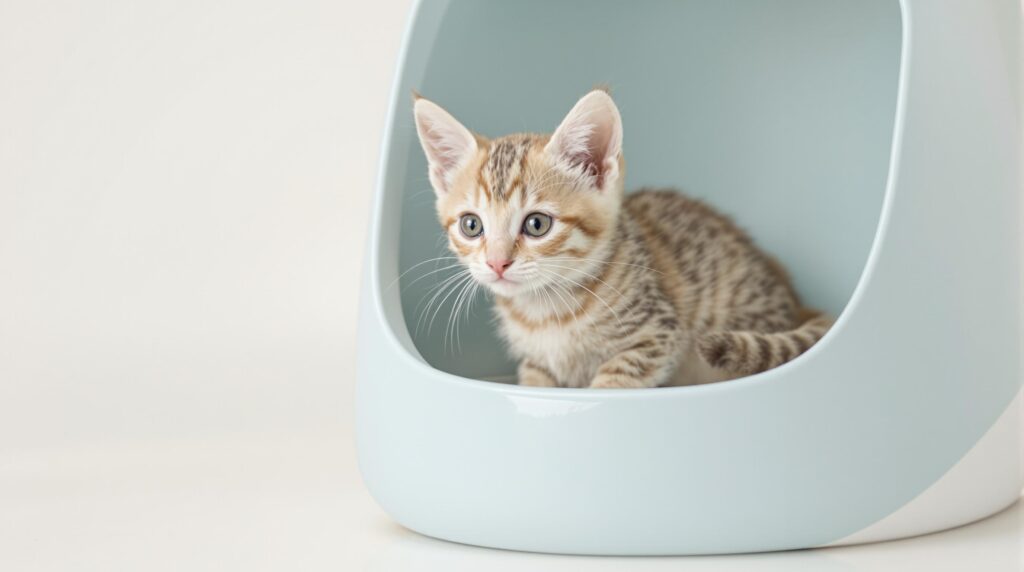
Key Takeaways
- At four weeks old, kittens start shifting from their mother’s milk to soft, solid food and need small, frequent meals to fuel their growth.
- Gentle handling, playtime, and safe environments support early socialization and help build confidence.
- Tracking weight, litter box habits, and activity levels can confirm healthy development or signal when extra care might be needed.
At four weeks old, your kitten is starting to move out of the newborn stage and into a world full of discovery. They still spend most of their time sleeping, but those bursts of energy are growing longer and more purposeful. This is when they begin exploring solid food, showing interest in their surroundings, and taking their first real steps toward independence.
These early weeks are full of big changes, and your involvement plays a huge role in shaping your kitten’s development. Gentle handling, early socialization, and exposure to safe, positive experiences help your kitten become a confident and friendly adult cat. You’ll start to notice personality traits forming during playtime, mealtimes, and cuddles—and each moment contributes to their growth.
Partnering with a veterinarian during this stage is essential. They’ll guide you through important milestones like nutrition, vaccinations, and parasite prevention. You can also turn to trusted resources like PetHealthMD, which offers reliable, up-to-date information to help you care for your kitten with confidence.
Development Milestones for 4-Week-Old Kittens
Four-week-old kittens are full of curiosity and just starting to explore the world around them. At this stage, they’re making big strides in both physical and social development, and knowing what to expect can help you give them the support they need to thrive.
Mobility is improving – Your kitten’s steps are becoming more steady, turning wobbly walks into more confident movement. You’ll notice them trying to follow you or their littermates around as their coordination improves.
Baby teeth are in – With their tiny teeth now fully in, it’s a great time to begin offering soft, wet kitten food alongside formula. This gradual transition supports their nutritional needs while helping them learn to eat on their own.
Play is more intentional – At four weeks, play becomes a key part of development. Kittens will start batting at toys, pouncing on siblings, and responding to movement. Offer soft balls, feather toys, or crinkly textures, and always supervise play to keep it safe.
Social skills are forming – Short, gentle handling sessions (5–10 minutes a few times a day) help your kitten get used to people. Use calm voices and slow movements to build trust and comfort. Many pet parents find that creating a small, kitten-proofed play zone with baby gates makes this easier.
Litter training begins – Your kitten may start pawing at bedding or wandering off after meals—signs they’re ready for litter training. Place a shallow box with kitten-safe litter in a quiet area to encourage good habits early on.
For more kitten care essentials, check out cat health and wellness products at 1800PetMeds.

Feeding Routine for 4-Week-Old Kittens
By four weeks old, your kitten is starting to shift from nursing to eating on their own—and setting up a thoughtful feeding routine now can make a big difference in their growth and development. At this age, they still need frequent meals and lots of gentle encouragement to build healthy eating habits.
Offer small, frequent meals – Aim for 4 to 6 meals a day, spaced out evenly. Start with a blend of kitten formula and wet food to ease the transition from nursing. A good starting ratio is three parts formula to one part wet kitten food, served at room temperature in a shallow dish.
Make meals easy and inviting – Use a low, non-slip dish to make it easier for your kitten to reach their food. If they’re hesitant, try warming the food slightly to make it more enticing. As they gain confidence, you can slowly adjust the mixture to include more solid food by week five.
Keep food fresh and the space clean – Store any unused wet food in an airtight container in the fridge, and wash bowls after each meal. A washable mat under the feeding area can help with spills, especially as your kitten gets the hang of eating more independently.
Track weight and appetite daily – Healthy kittens should gain about half an ounce each day. Use a kitchen scale to keep track, and contact your vet if your kitten isn’t gaining weight or seems uninterested in food.
Provide fresh water at all times – Even though most hydration still comes from formula and wet food, it’s important to introduce a shallow dish of clean water. Keep it near—but not right next to—the food to encourage good drinking habits.
For more kitten nutrition essentials, explore cat food and supplements at 1800PetMeds.
Building Social Skills in 4-Week-Old Kittens
As your kitten becomes more alert and mobile, they start showing interest in the world around them. This early stage of development is the perfect time to introduce positive social experiences that encourage healthy habits and confidence. With a little planning and gentle interaction, you can help shape your kitten’s personality and comfort around people, sounds, and new environments.
Set up a safe, cozy play area – Designate a quiet space where your kitten can explore safely. Use soft bedding, shallow climbing platforms, and a few age-appropriate toys to create an inviting environment. Avoid busy areas of the home to prevent overstimulation while your kitten is still adjusting.
Keep playtime short and gentle – Play is essential for bonding and developing coordination, but young kittens tire quickly. Aim for 5–10 minute sessions throughout the day using soft toys like teasers or small plush animals. Let your kitten lead the pace and stop when they lose interest.
Introduce new experiences slowly – Everyday sounds and objects may be new to your kitten, so expose them gradually. Quietly introduce common household noises and items like soft brushes, scratching posts, or low music to build comfort and reduce fear.
Practice gentle handling – Hold your kitten with care by supporting their chest and hind legs, and speak softly to build trust. Short daily sessions help your kitten feel safe in your arms, preparing them for future grooming and vet visits.
Offer variety through toys and textures – Swap out toys every few days and include different textures like crinkly tunnels, carpet squares, or fleece mats. These small changes help build confidence and prevent fearfulness toward new things later in life.
For more ways to enrich your kitten’s environment, browse cat toys and accessories at 1800PetMeds.

FAQs About Caring for 4-Week-Old Kittens
How can I tell if my kitten needs extra nutritional support?
Healthy kittens at this age are usually active, bright-eyed, and steadily gaining weight—about 10 grams per day. If your kitten seems sluggish, disinterested in food, or isn’t gaining consistently, talk to your vet about adjusting their diet or adding supplements.
What should I do if my kitten struggles with the weaning process?
The weaning process takes time. If your kitten resists solid food, try mashing it into a thinner consistency or using a weaning-friendly dish that’s easy to access. Warm the food just a bit, and stay patient—many kittens just need a little encouragement.
What social behaviors should I watch for?
Around this time, kittens become more curious and start reacting to sights, sounds, and gentle handling. Keep interactions short and calm, offering soft toys and plenty of praise. These early experiences help build trust and shape a well-adjusted adult cat.
Caring for 4-Week-Old Kittens: Next Steps
Caring for a 4-week-old kitten is an exciting chapter filled with tiny milestones. At this stage, your kitten needs small, frequent meals as they begin transitioning from formula to wet food. You’ll also see new behaviors emerge—like playful pouncing and early attempts at using the litter box. If you’re thinking about adopting, bringing home a pair of kittens can be a great choice. They’ll learn social skills together and keep each other company during play and rest.
Start building a strong health routine early. Your kitten should see a veterinarian shortly after arriving home to set up a wellness plan that includes vaccines, parasite prevention, and nutrition guidance tailored to their growth. With the right care, your kitten will be on track for a happy, healthy life.
To help you stay stocked on essentials like kitten-safe food, litter, and flea & tick preventatives, explore cat supplies at 1800PetMeds.





